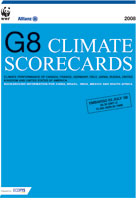|
 Leaders from the world's developed countries met July 7 - 9, 2008 in Hokkaido, Japan for the 2008 G8 Summit.
Leaders from the world's developed countries met July 7 - 9, 2008 in Hokkaido, Japan for the 2008 G8 Summit.
Visit July 2008 G8 Summit in Hokkaido, Japan website
Climate change and the environment were main themes of the meeting but leaders were widely criticized for failing to deepen their commitments to greenhouse gas reductions with mid term targets and identification of a baseline year, like 1990 for the Kyoto Protocol.
View July 9, 2008 Chair's Summary for the 2008 G8 Summit in Hokkaido, Japan
The G8 leaders called for a global reduction in greenhouse gas emissions by at least 50% by 2050, but didn't specify a base year (for example, 50% of 1990 emission levels or 50% of 2008 emissions).
The head of the UN Climate Change Secretariat, Yvo de Boer, who leads the UN's negotiations for a new climate change treaty starting in 2012, was critical of the lack of a baseline for the 50% reduction target, saying this lack left it open to vastly different interpretations. He also identified that the G8 said nothing about making that goal legally binding in a renewed UN Protocol.
Clare Demerse from the Pembina Institute commented, "Without a base year, we cannot be sure the G8 target is even aligned with what the science tells us we need to do in order to avoid dangerous climate change."
Mid-term emissions reductions targets (targets for 2020) were also absent from the G8's statements. "What I find lacking is any kind of language on where industrialized nations, G8 nations, want their emissions to be in 2020 and I think that is critical to making progress in the negotiations," said Yvo de Boer.
The Inter-Governmental Panel on Climate Change has suggested emissions need to be slashed to 25%-40% below 1990 levels within the next dozen years to avoid the worst impacts of climate change - such as rising sea levels, worse droughts and extinction of many species.
Environmentalists also argue that adopting midterm goals would provide business with clearer investment guidance and would encourage developing countries to join efforts to control pollution blamed for global warming.
View July 8, 2007 Climate Action Network Canada press release
View July 8, 2008 WWF press release
View WWF's July 8, 2008 statement on G8 Climate Decisions
View July 9, 2008 Reuters article on Planet Ark
View July 9, 2008 Associated Press article in the International Herald Tribune
View DeSmog Blog Commentary on Canada's role: July 4 & July 10, 2008
Sources: G8 Climate Summit, Reuters, Climate Action Network Canada, WWF, Associated Press
G8 Refuses to Accept G5 Offer to Curb Emissions Provided that the G8 Takes the Lead
On the final day of the G8 Summit, eight other "major economies" from developing countries such as China, India, Indonesia, Brazil, Mexico and South Africa joined the G8 countries. Together, the nations are responsible for emitting 80% of the world's greenhouse gases into the atmosphere.
Unsurprisingly, the developing countries refused to accept the G8's offer of vague long-term targets (50% reduction in GHG emissions by 2050 - but with not baseline year of reference) and instead, extended their own offer to the G8. The developing nations called on developed countries to take the lead in adopting deep emissions reductions targets but pledged that developing countries would take on quantitative emissions reductions compared to 'business as usual' as long as they were facilitated through financing and support for technology transfer by the developed nations.
The G5's more detailed and more ambitious proposal, also supported by many G8 countries, which essentially has three elements:
- developed countries should take the lead with ambitious and absolute emission reductions of between 80% and 95% below 1990 levels by mid-century;
- quantified emission targets under the Kyoto Protocol toward the upper end of the range of 25% to 40% below 1990 levels by 2020 for all developed countries; and
- deviation from business-as-usual emission trajectories in developing countries, supported and enabled by technology and financing.
The G5 nations also noted that mid-term targets for developed countries should be "based on an equitable burden-sharing paradigm that reflects historical responsibility for the problem."
View July 9, 2008 statement from South African Minister of Environmental Affairs and Tourism, Climate Change discussions during G8 and Major Economies Meeting in Japan
The G5 developing country position statement is in line with statements from the Intergovernmental Panel on Climate Change regarding:
- the need for 2020 targets for industrialized countries in the range of 25-40% below 1990 emissions levels;
- quantitative reductions compared to 'business as usual' in developing countries (in addition to the efforts already being made through developing countries' own initiatives), facilitated through measurable, reportable and verifiable financing and support for technology transfer to developing nations.
View July 10, 2008 China Daily article
View July 9, 2008 CBC News article
Sources: G5 Developing Countries, CBC, China Daily
 On July 3, 2008, the World Wildlife Fund and German insurance giant Allianz SE, ranked Canada the second to last in the G8 group of nations for its lack of effort to curb greenhouse gases emissions.
On July 3, 2008, the World Wildlife Fund and German insurance giant Allianz SE, ranked Canada the second to last in the G8 group of nations for its lack of effort to curb greenhouse gases emissions.
Each of the G8 countries were evaluated against twelve objective performance criteria, including greenhouse gas emission trends and progress made toward meeting Kyoto targets.
Canada scored seventh, just ahead of the United States, with very high emissions per capita compared to the average of industrialized countries. Alberta's highly energy-intensive tar sands extraction and processing also figured in the country's low score, as did the lack of sufficient provincial or federal regulations to reduce overall emissions, Canada's reluctance to comply with Kyoto targets, and a persistent trend of growing emissions.
 Download WWF's 2008 G8 Climate Scorecards (PDF) Download WWF's 2008 G8 Climate Scorecards (PDF)
On June 28, 2008, WWF released a position paper articulating its perspectives on what the 2008 G8 Summit in Japan ought to achieve on climate change policy.
View WWF's June 2008 Position Paper, G8 summit 2008 in Japan: A vision for leadership by industrialized nations (PDF)
Source: World Wildlife Fund
 Environment ministers of the Group of Eight (G8) leading industrialized nations, and officials from leading developing countries met in Potsdam, Germany March 15-17, 2007 to prepare for a June G8 summit at which climate change will be a major topic.
Environment ministers of the Group of Eight (G8) leading industrialized nations, and officials from leading developing countries met in Potsdam, Germany March 15-17, 2007 to prepare for a June G8 summit at which climate change will be a major topic.
Besides environment ministers from the G8, the meeting also included representatives from China, India, Brazil, Mexico and South Africa.
Executive Secretary of the United Nations Framework Convention on Climate Change, Yvo de Boer, indicated progress had been achieved and noted a broad consensus on the causes of global warming.
German Environment Minister Sigmar noted that consensus was reached on many issues, including a general acceptance of the scientific explanation for the causes of global warming. The ministers agreed that industrialized countries are responsible for most greenhouse gas emissions; on the need to help developing countries control their emissions; and that industrialized countries need to reduce carbon dioxide emissions more than mandated by current agreements.
The fact that the delegates were able to find common ground reflects a significant shift in the position of the US, which for years has questioned the reliability of scientific findings showing man-made pollution is responsible for the planet's warming. The US now supports the conclusions of a February 2007 UN report stating that humankind is to blame for global warming.
The US also, however, was a source of dissent at the meeting, refusing to support carbon dioxide (CO2) emissions reduction targets and remaining opposed to a global carbon emissions trading scheme similar to that of the European Union, which allows companies in energy-intensive industries to trade carbon dioxide (CO2) emissions.
A group of 40 German and international non-governmental organizations (NGOs) presented a joint G8 policy paper at the summit that focused on climate change policy, but also includes demands related to biodiversity, investment policy, intellectual property rights, development in Africa and debt cancellation.
No formal negotiations were conducted in Potsdam; delegates were laying the groundwork for the G8 summit in June in the northern German town of Heiligendamm and for the UN's climate conference in Bali, Indonesia, in December 2007.
View the March 17, 2006 Deutsche Presse-Agentur article on Monsters and Critics
View the March 18, 2007 Canadian Press article on Canada.com
View the March 17, 2007 article on Bloomberg.com
 Download the G8 NGO policy paper, Testing the Credibility of the Powerful: Concrete Action for Environment and Development! (PDF) Download the G8 NGO policy paper, Testing the Credibility of the Powerful: Concrete Action for Environment and Development! (PDF)
Sources: Reuters, Deutsche Presse-Agentur, Canadian Press, Bloomberg.com
 Russia took over the G8 Presidency from Britain on January 1, 2006. At the 2005 G8 summit, political leaders vowed to "act with resolve and urgency" on climate change. Climate change was, however, sidelined by the issue of energy security in the 2006 summit, held in St. Petersburg, July 15 - 17, 2006. The shift in emphasis raised concerns and alarm bells in global civil society and in academic circles. The G8 Presidency sets the priorities for G8 summits.
Russia took over the G8 Presidency from Britain on January 1, 2006. At the 2005 G8 summit, political leaders vowed to "act with resolve and urgency" on climate change. Climate change was, however, sidelined by the issue of energy security in the 2006 summit, held in St. Petersburg, July 15 - 17, 2006. The shift in emphasis raised concerns and alarm bells in global civil society and in academic circles. The G8 Presidency sets the priorities for G8 summits.
Visit the official 2006 G8 website
The 2006 G8 Statement on Global Energy security does encourage energy efficiency and renewable energy technologies, but favors continued reliance on oil and other fossil fuels. Also of concern is the identification of nuclear energy as one way to address global climate change.
View the G8 statement on Global Energy Security
Visit the Civil G8 website
View the Civil G8's statement on Global Energy Security
View a statement by the national science academies of the G8 nations and Brazil, China, India and South Africa on Energy Sustainability & Security
Visit the University of Toronto Munk Centre for International Studies' G8 Information Centre
 For his year-long presidency of the Group of Eight industrial nations (G8), British Prime Minister Tony Blair has put climate change at the heart of the agenda.
For his year-long presidency of the Group of Eight industrial nations (G8), British Prime Minister Tony Blair has put climate change at the heart of the agenda.
Following the G8 Summit held July 6-8, 2005, in Gleneagles, Scotland, leaders of the G8 countries issued a joint communiqué and a "plan of action" on Climate Change, Clean Energy, and Sustainable Development (see G8 Outcomes link below for a summary).
 Download UN Framework on Climate Change July 8, 2005 release (PDF) Download UN Framework on Climate Change July 8, 2005 release (PDF)
View the Pew Centre on Global Climate Change Summary of the G8 Summit
View Manitoba Wildlands' news items on the July 2005 G8 Summit:
G8 Summit and Climate Change - July 4, 2005 
Leaked Climate Change Document 'Watered Down' - July 7, 2005 
G8 Summit Outcomes - Climate Change - July 26, 2005 
|

 2002-2014
2002-2014

 2002-2014
2002-2014